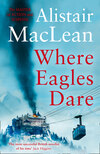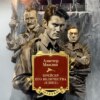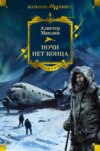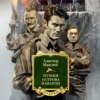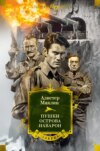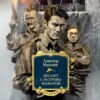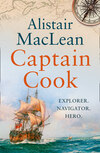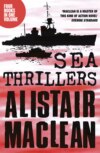Читать книгу: «Where Eagles Dare», страница 3
He lay face down for several minutes until breathing and pulse returned to something like normal—or what was normal for seven thousand feet—rose and examined the piton round which the nylon passed. It seemed firm enough but, for good measure, he gave it another few heavy blows with the hammer, undid the double bowline round his legs and secured the end of the rope to the piton with a round turn and two half-hitches, hauling on the rope until the knot locked tight.
He moved a few feet farther away from the cliff edge, cleared away the snow and lightly hammered in one of the spare pitons he had brought with him. He tested it with his hand to see if it broke clear easily. It did. He tapped it in lightly a second time and led round it the part of the rope that was secured to the firmly anchored first piton. Then he walked away, moving up the gently sloping plateau, whistling ‘Lorelei’. It was, as Smith himself would have been the first to admit, a far from tuneful whistle, but recognizable for all that. A figure appeared out of the night and came running towards him, stumbling and slipping in the deep snow. It was Mary Ellison. She stopped short a yard away and put her hands on her hips.
‘Well!’ He could hear her teeth chattering uncontrollably with the cold. ‘You took your time about it, didn’t you?’
‘Never wasted a minute,’ Smith said defensively. ‘I had to have a hot meal and coffee first.’
‘You had to have—you beast, you selfish beast!’ She took a quick step forward and flung her arms around his neck. ‘I hate you.’
‘I know.’ He pulled off a gauntlet and gently touched her disengaged cheek. ‘You’re frozen.’
‘You’re frozen, he says! Of course I’m frozen. I almost died in that plane. Why couldn’t you have supplied some hot water bottles—or—or an electrically heated suit or—or something? I thought you loved me!’
‘I can’t help what you think,’ Smith said kindly, patting her on the back. ‘Where’s your gear?’
‘Fifty yards. And stop patting me in that—that avuncular fashion.’
‘Language, language,’ Smith said. ‘Come on, let’s fetch it.’
They trudged upwards through the deep snow, Mary holding his arm tightly. She said curiously: ‘What on earth excuse did you give for coming back up here? Lost a cuff-link?’
‘There was something I had to come for, something apart from you, although I gave a song-and-dance act of having forgotten about it until the last moment, until it was almost too late. The radio code-book inside Sergeant Harrod’s tunic.’
‘He—he lost it? He dropped it? How—how could he have been so criminally careless!’ She stopped, puzzled. ‘Besides, it’s chained—’
‘It’s still inside Sergeant Harrod’s tunic,’ Smith said sombrely. ‘He’s up here, dead.’
‘Dead?’ She stopped and clutched him by the arms. After a long pause, she repeated: ‘He’s dead! That—that nice man. I heard him saying he’d never jumped before. A bad landing?’
‘So it seems.’
They located the kit-bag in silence and Smith carried it back to the edge of the cliff. Mary said: ‘And now? The code-book?’
‘Let’s wait a minute. I want to watch this rope.’
‘Why the rope?’
‘Why not?’
‘Don’t tell me,’ Mary said resignedly. ‘I’m only a little girl. I suppose you know what you’re doing.’
‘I wish to God I did,’ Smith said feelingly.
They waited, again in silence, side by side on the kit-bag. Both stared at the rope in solemn concentration as if nylon ropes at seven thousand feet had taken on a special meaningfulness denied nylon ropes elsewhere. Twice Smith tried to light a cigarette and twice it sputtered to extinction in the drifting snow. The minutes passed, three, maybe four: they felt more like thirty or forty. He became conscious that the girl beside him was shivering violently—he guessed that she had her teeth clamped tight to prevent their chattering—and was even more acutely conscious that his entire left side—he was trying to shelter her from the wind and snow—was becoming numb. He rose to leave when suddenly the rope gave a violent jerk and the piton farther from the cliff edge was torn free. The loop of the rope slid quickly down past the piton to which it was anchored and kept on going till it was brought up short by its anchor. Whatever pressure was on the rope increased until the nylon bit deeply into the fresh snow on the cliff edge. Smith moved across and tested the pressure on the rope, at first gingerly and tentatively then with all his strength. The rope was bar-taut and remained bar-taut. But the piton held.
‘What—what on earth—’ Mary began, then broke off. Her voice was an unconscious whisper.
‘Charming, charming,’ Smith murmured. ‘Someone down there doesn’t like me. Surprised?’
‘If—if that spike hadn’t held we’d never have got down again.’ The tremor in her voice wasn’t all due to the cold.
‘It’s a fair old jump,’ Smith conceded.
He took her arm and they moved off. The snow was heavier now and even with the aid of their torches visibility was no more than six feet, but, by using the rocky outcrop as a bearing, it took Smith no more than two minutes to locate Sergeant Harrod, now no more than a featureless mound buried in the depths of the snow-drift. Smith brushed aside the covering shroud of white, undid the dead man’s tunic, recovered the codebook, hung the chain round his neck and buttoned the book securely inside his own Alpenkorps uniform.
Then came the task of turning Sergeant Harrod over on his side. Unpleasant Smith had expected it to be, and it was: impossible he hadn’t expected it to be, and it wasn’t—not quite. But the effort all but defeated him, and the dead man was stiff as a board, literally frozen solid into the arms outflung position into which he had fallen. For the second time that night Smith could feel the sweat mingling with the melted snow on his face. But by and by he had him over, the frozen right arm pointing up into the snow-filled sky. Smith knelt, brought his torch close and carefully examined the back of the dead man’s head.
‘What are you trying to do?’ Mary asked. ‘What are you looking for?’ Again her voice was a whisper.
‘His neck is broken. I want to find out just how it was broken.’ He glanced up at the girl. ‘You don’t have to look.’
‘Don’t worry.’ She turned away. ‘I’m not going to.’
The clothes, like the man, were frozen stiff. The hood covering Harrod’s head crackled and splintered in Smith’s gauntleted hands as he pulled it down, exposing the back of the head and neck. Finally, just below the collar of the snow-smock, Smith found what he was searching for—a red mark at the base of the neck where the skin was broken. He rose, caught the dead man’s ankles and dragged him a foot or two down the slope.
‘What now?’ In spite of herself Mary was watching again, in reluctant and horrified fascination. ‘What are you looking for now?’
‘A rock,’ Smith said briefly. There was a cold edge to the words and although Mary knew it wasn’t intended for her, it was an effective discouragement to any further questioning.
Smith cleared the snow for two feet around where Harrod’s head had lain. With hand and eyes he examined the ground with meticulous care, rose slowly to his feet, took Mary’s arm and began to walk away. After a few steps he hesitated, stopped, turned back to the dead man and turned him over again so that the right arm was no longer pointing towards the sky.
Half-way back to the cliff edge, Smith said abruptly:
‘Something struck Harrod on the back of the neck. I thought it might have been a rock. But there was no rock where he lay, only turf.’
‘There was a rocky outcrop nearby.’
‘You don’t break your neck on a rocky outcrop, then stand up and jump out into a snowdrift. Even had he rolled over into the drift, he could never have finished with his head seven feet out from the rock. He was struck by some hard metallic object, either the butt of a gun or the haft of a knife. The skin is broken but there is no bruising for the neck was broken immediately afterwards. When he was unconscious. To make us think it was an accident. It must have happened on the rock—there was no disturbance in the snow round Harrod—and it must have happened while he was upright. A tap on the neck, a quick neck-twist, then he fell or was pushed over the edge of the outcrop. Wonderful stuff, stone,’ Smith finished bitterly. ‘It leaves no footprints.’
Mary stopped and stared at him.
‘Do you realize what you’re saying?’ She caught his speculative and very old-fashioned look, took his arm and went on quickly: ‘No, I mean the implications. I’m sorry, I’m sorry, of course you do, John, I—I’m scared. Even all those months with you in Italy—well, you know, nothing like this—’ She broke off, then continued: ‘Couldn’t there—couldn’t there be some other explanation?’
‘Like he hit himself on the back of the head or the abominable snowman got him?’
She looked at him steadily, her dark eyes far too large in what could be seen of her hooded face. ‘I don’t deserve that, John. I am frightened.’
‘Me, too.’
‘I don’t believe you.’
‘Well, if I’m not, it’s damn well time I started to be.’
Smith checked his descent when he estimated he was about forty feet from the base of the cliff. He took two turns of the nylon round his left leg, damped it with his right, took a turn round his left arm, pulled off his right gauntlet with his teeth, stuffed it inside his tunic, eased out his Luger, slid the safety catch and went on his way again, checking his speed of descent with his gauntleted hand. It was a reasonable enough expectation that whoever had tried to pull down the rope would be waiting there to finish off the job.
But there was no reception committee waiting, not, at least, at the spot where he touched down. He traversed a quick circle with his torch. There was nobody there and nothing there and the footprints that must have been there were long obscured by the drifting snow. Gun in one hand, torch in the other, he moved along the cliff face for thirty yards then moved out in a semi-circle until he arrived back at the cliff-face. The rope-puller had evidently opted for discretion. Smith returned to the rope and jerked it. In two minutes he had Mary’s kit-bag down and, a few minutes later, Mary herself. As soon as she had stepped out of the double bowline, Smith undid the knot, pulled the rope down from the top of the cliff and coiled it. So numbed and frozen were his hands by this time that the operation took him nearly fifteen minutes.
Rope over one shoulder, her kit-bag on the other, Smith led Mary to the fissure in the cliff side.
‘Don’t pitch the tent,’ Smith said. ‘Unroll it, put your sleeping bag on one half, get into it and pull the other half of the tent over you. Half an hour and you’ll be covered with drifting snow. The snow will not only keep you warm, it’ll hide you from any somnambulists. I’ll be along in the morning before we leave.’
He walked away, stopped, looked back. Mary was still standing where he had left her, looking after him. There was no sag to her shoulders, no particular expression to her face, but for all that she looked oddly defenceless, lonely and forlorn, a quality as indefinable as it was unmistakable. Smith hesitated, then went back to her, unrolled her tent and sleeping bag, waited till she had climbed in, zipped up the bag and pulled the other half of the tent up to her chin. She smiled at him. He fixed the sleeping bag hood, pulled a corner of the tent over it and left, all without saying a word.
Locating his own tent was simple enough, a steady light burnt inside it. Smith beat the snow from his clothes, stooped and entered. Christiansen, Thomas and Carraciola were in their sleeping bags and were asleep or appeared to be. Torrance-Smythe was checking over their store of plastic explosives, fuses, detonators and grenades, while Schaffer was reading a paper-back—in German—smoking a cigarette—also German—and faithfully guarding the radio. He put down the book and looked at Smith.
‘OK?’
‘OK.’ Smith produced the code-book from his tunic. ‘Sorry I was so long, but I thought I’d never find him. Drifting pretty badly up there.’
‘We’ve arranged to take turns on watch,’ Schaffer said. ‘Half an hour each. It’ll be dawn in three hours.’
Smith smiled. ‘What are you guarding against in these parts?’
‘The abominable snowman.’
The smile left Smith’s face as quickly as it had come. He turned his attention to Harrod’s codebook and spent about ten minutes in memorizing call-up signals and wave-frequencies and writing a message out in code. Before he had finished Schaffer had turned into his sleeping bag, leaving Torrance-Smythe on watch. Smith folded the message, tucked it in a pocket, rose, took the radio and a rubber ground-sheet to protect it from the snow.
‘I’m going to move out a bit,’ he said to Torrance-Smythe. ‘Reception is lousy among trees. Besides, I don’t want to wake everyone up. Won’t be long.’
Two hundred yards from the tent, after having stopped twice and changed direction twice, Smith knelt with his back—and the rubber ground-sheet —to the drifting snow. He extended a fourteen feet telescopic aerial, adjusted a pre-selected call-up and cranked a handle. Four times he cranked the handle and on the fifth he got results. Someone was keeping a very close radio watch indeed.
‘This is Danny Boy,’ the set speaker crackled. The signal was faint and intermittent, but just comprehensible. ‘Danny Boy replying to you. Over.’
Smith spoke into the mouth microphone. ‘This is Broadsword. Can I speak to Father Machree or Mother Machree? Over.’
‘Sorry. Unavailable. Over.’
‘Code,’ Smith said. ‘Over.’
‘Ready.’
Smith extracted the paper from his pocket and shone his torch on it. There were two lines containing meaningless jumbles of letters and, below that, the plain language translation, which read: ‘SAFE LANDING HARROD DEAD WEATHER FINE PLEASE AWAIT MESSAGE 0800 GMT. Smith read off the corresponding code figures and finished off: ‘Have that delivered to Father Machree by 0700. Without fail.’
Torrance-Smythe looked up at Smith’s return.
‘Back already?’ Surprise in his voice. ‘You got through?’
‘Not a chance,’ Smith said disgustedly. ‘Too many bloody mountains around.’
‘Didn’t try for very long, did you?’
‘Two and a half minutes.’ It was Smith’s turn to look surprised. ‘Surely you know that’s the safe maximum?’
‘You think there may be radio monitoring stations hereabouts?’
‘Oh, no, not at all.’ Smith’s voice was heavy with sarcasm. ‘You wouldn’t expect to find radio monitors in the Schloss Adler, would you now?’
‘Well, now.’ Torrance-Smythe smiled tiredly. ‘I believe someone did mention it was the southern HQ of the German Secret Service. Sorry, Major. It’s not that I’m growing old, though there’s that, too. It’s just that what passes for my mind is so gummed up by cold and lack of sleep that I think it’s stopped altogether.’
Smith pulled off his boots and snow-suit, climbed into his sleeping bag and pulled the radio close to him.
‘Then it’s time you had some sleep. My explosives expert is going to be no good to me if he can’t tell a detonator from a door-knob. Go on. Turn in. I’ll keep watch.’
‘But we had arranged—’
‘Arguments, arguments,’ Smith sighed. ‘Insubordination on every hand.’ He smiled. ‘Straight up, Smithy, I’m wide awake. I know I won’t sleep tonight.’
One downright lie, Smith thought, and one statement of incontrovertible truth. He wasn’t wide awake, he was physically and mentally exhausted and on the slightest relaxation of will-power oblivion would have overtaken him in seconds. But that he wouldn’t sleep that night was beyond doubt: no power on earth would have let him sleep that night but, in the circumstances, it was perhaps wiser not to say so to Torrance-Smythe.
THREE
The pre-dawn greyness was in the sky. Smith and his men had broken camp. Tent and sleeping bags were stored away and the cooking utensils—after a very sketchy breakfast scarcely deserving of the name—were being thrust into haversacks. There was no conversation, none at all: it wasn’t a morning for speaking. All of them, Smith thought, looked more drawn, more exhausted, than they had done three hours ago: he wondered how he himself, who had had no sleep at all, must look. It was as well, he reflected, that mirrors were not part of their commando equipment. He looked at his watch.
‘We’ll leave in ten minutes,’ he announced. ‘Should give us plenty of time to be down in the tree line before sun-up. Assuming there are no more cliffs. Back in a moment. Visibility is improving and I think I’ll go recce along the cliff edge. With any luck, maybe I can see the best way down.’
‘And if you haven’t any luck?’ Carraciola asked sourly.
‘We’ve still that thousand feet of nylon rope,’ Smith said shortly.
He pulled on his snow-suit and left, angling off in the direction of the cliff. As soon as he was beyond the belt of the scrub pines and out of sight of the camp he changed direction uphill and broke into a run.
A single eye appeared under a lifted corner of snow-covered canvas as Mary Ellison heard the soft crunch of running footsteps in the snow. She heard the first two bars of a tuneless whistling of ‘Lorelei’, unzipped her sleeping bag and sat up. Smith was standing above her.
‘Not already!’ she said protestingly.
‘Yes, already. Come on. Up!’
‘I haven’t slept a wink.’
‘Neither have I. I’ve been watching that damned radio all night—and watching to check that no somnambulists took a stroll in this direction.’
‘You kept awake. You did that for me?’
‘I kept awake. We’re off. Start in five minutes.
Leave your tent and kit-bag here, you won’t be requiring them again. Take some food, something to drink, that’s all. And for God’s sake, don’t get too close to us.’ He glanced at his watch. ‘We’ll stop at 7 a.m. Check your watch. Exactly 7 a.m. And don’t bump into us.’
‘What do you think I am?’ But Smith didn’t tell her what he thought she was. He had already gone.
A thousand feet farther down the side of the Weissspitze the trees were something worth calling trees, towering conifers that soared sixty and seventy feet up into the sky. Into the clear sky, for the snow had stopped falling now. It was dawn.
The slope of the Weissspitze was still very steep, perhaps one in four or five. Smith, with his five men strung out behind him in single file, slipped and stumbled almost constantly: but the deep snow, Smith reflected, at least cushioned their frequent falls and as a mode of progress it was a damn sight preferable to shinning down vertical cliff-faces on an impossibly thin clothes-line. The curses of his bruised companions were almost continuous but serious complaints were marked by their total absence: there was no danger, they were making excellent time and they were now completely hidden in the deep belt of trees.
Two hundred yards behind them Mary Ellison carefully picked her way down the tracks made by the men below her. She slipped and fell only very occasionally for, unlike the men, she was carrying no over-balancing gear on her back. Nor had she any fear of being observed, of coming too close to Smith and the others: in still, frosty air on a mountain sound carries with a preternatural clarity and from the sound of the voices farther down the slope she could judge her distance from them to a nicety. For the twentieth time she looked at her watch: it was twenty minutes to seven.
Some time later, for much more than the twentieth time, Smith checked his watch again. It was exactly 7 o’clock. The dawn had gone and the light of full day-time filtered down through the snow-bent boughs of the conifers. Smith stopped and held up his hand, waiting until the other five had caught up with him.
‘We must be half-way down now.’ He shrugged off the heavy pack on his back and lowered it gratefully into the snow. ‘I think it’s time we had a look at the scenery.’
They piled their gear and moved off to their right. Within a minute the pines started to thin out and at a signal from Smith they all dropped to hands and knees and crawled forward the last few yards towards the edge of the belt of pines. Smith carried a telescope in his hand: Christiansen and Thomas both wore binoculars. Zeiss binoculars. Admiral Rolland had left nothing to chance. Beyond the last of the pines a mound of snow obstructed their view of the valley below. Shrouded from top to toe, in the all-enveloping white of their snow-smocks, they completed the last few feet on their elbows and knees.
What lay below them was something out of a fairy tale, an impossibly beautiful scene from an impossibly beautiful fairy tale, a fairy tale set aeons back in the never-never land of the age of dreams, a kindlier land, a nobler land than man had ever known since first he had set his hand against his brother. A land that never was, Smith thought, a land that never was: but there it lay before them, the golden land that never was, the home of that most dreaded organization in the entire world, the German Gestapo. The impeccable incongruity of it all, Smith reflected, passed all belief.
The valley was bowl-shaped, open to the north, hemmed in by steeply rising hills to the east and west, closed off by the towering bulk of the Weissspitze to the south.
A scene of fantastic beauty. Nine thousand, seven hundred and ten feet in height, the second highest mountain in Germany, the Weissspitze soared up menacingly like another north wall of the Eiger, its dazzling whiteness caught in the morning sun, its starkly lovely outline sharply etched against the now cloudless blue of the sky. High up near the cone-shaped summit could be seen the line of black rock marking the cliff Smith and his men had descended during the night with, just below it, a much greater cliff-face on the plateau above which they had spent the night.
Directly opposite where they lay, and almost exactly on the same level, was the Schloss Adler itself. The castle of the eagle had been aptly named, an impregnable fortress, an inaccessible eyrie set between mountain and sky.
Just below the spot where the steep-sided slopes of the Weissspitze began to flatten out northwards into the head of the valley, a geological freak, known as a volcanic plug, jutted two hundred vertical feet up into the sparkling, ice-cold air. It was on this that the Schloss Adler had been built. The northern, western and eastern sides of this volcanic plug were sheer, perpendicular walls of rock, walls that swept up smoothly, without intermission or break into the structure of the castle itself: from where they lay, it was impossible to say where the one ended and the other began. To the south, a steeply-sloping ridgeback connected the plug to the equally sloping ramparts of the Weissspitze.
The castle itself was another dream, the dream of the apotheosis of medievalism. This dream, Smith was aware, was as illusory as the golden age of its setting. It wasn’t medieval at all, it had been built as late as the mid-nineteenth century to the express order of one of the madder of the Bavarian monarchs who had suffered from a comprehensive list of delusions, of which grandeur had not been the least. But, delusions or not, he had had, as the deluded so often have—to the dismay and consternation of their allegedly saner brethren—impeccable taste. The castle was perfect for the valley, the valley for the castle. Any other combination would have been inconceivable.
The Schloss Adler was built in the form of a hollow square. It was towered, battlemented and crenellated, its most imposing aspects, two perfectly circular towers, the one to the east higher than that to the west, facing down the valley towards the north. Two smaller, but still magnificent towers, lay at the southern corners, facing the looming bulk of the Weissspitze. From where Smith lay, at some slight level above that of the castle, he could just see into the open square in its middle, outside access to which was obtained by a pair of huge iron gates at the rear. The sun had not yet climbed sufficiently high above the eastern hills for its rays to strike the castle directly, but, for all that, its incredibly white walls gleamed and glittered as if made of the most iridescent marble.
Below the soaring northern ramparts of the castle the valley fell away steeply to the Blau See, beautiful pine-fringed jewel of a lake of the deepest and most sparkling blue, a colour which with the green of the pines, the white dazzle of the snow and the brilliant, lighter blue of the sky above formed a combination of breath-taking loveliness, Impossibly lovely, Smith thought, a completely faithful colour reproduction of the scene would have had everybody shouting ‘fake’.
From where they lay they could see that the belt of pines in which they lay hidden extended almost all the way down to the lake. Getting down there unobserved would be no problem at all. An almost exactly matching line of pines swept down the opposite—the eastern—side of the valley. From the lake those two long sweeps of pines, climbing steadily upwards as they marched to the south, must have appeared like a pair of great curving horns almost meeting at the top of the lower of the two cliff-faces on the Weissspitze.
A small village lay at the head of the lake. Basically it consisted of a single wide street, perhaps two hundred yards in length, a railway station, two inevitable churches perched on two inevitable knolls and a thin scattering of houses climbing up the steep slopes on either side of the village. From the southern end of the village a road curved up the far side of the valley till it reached the ridge-back to the south of the castle: this ridgeback it ascended by a series of hairpin bends, the last of which led to the great doors guarding the forecourt at the back of the castle. The road, just then, was completely blocked by snow and sole access to the castle was obviously by means of the Luftseilbahn, an aerial cableway. Two cables stretched from the village straight up to the castle, crossing three supporting pylons en route. Even as they watched, a cable-car was completing the last section of its journey up to the castle. At a distance of not much more than a hundred feet from the glittering walls of the Schloss Adler it appeared to be climbing almost vertically.
On the Blau See, about a mile beyond the village, lay a very large group of regularly spaced huts, arranged in rectangular patterns. It bore an uncommonly close resemblance to a military encampment.
‘Well, I’ll be damned!’ With an almost physical effort of will, Schaffer forced himself to look away and Smith could see the wonder reflected in his eyes. ‘Is this for real, boss?’
It wasn’t a question that called for an answer.
Schaffer had summed up their collective feeling pretty well and there was nothing that anyone could add that wouldn’t seem and sound superfluous. Prone in the snow, they watched in silence as the cable-car climbed agonizingly slowly up the last fifty feet towards the castle. It seemed as if it would never make it and Smith could almost palpably sense the empathy of his companions and himself as they willed that little car on the last few feet of its journey. But make it it did and it disappeared from sight under the roof of the cable header station that had been built into the western foot of the castle. The tension relaxed and Schaffer cleared his throat.
‘Boss,’ he said diffidently, ‘there are a couple of minor points that occur to me. Requiring elucidation, one might say. First of all, if I didn’t know better I’d say that was a military barracks down by that little old lake there.’
‘You don’t know better. That is a military barracks down by that little old lake there. And no ordinary military barracks either, I might say. That’s the training HQ of the Jäger battalions of the Wehrmacht’s Alpenkorps.’
‘Oh, my gosh! The Alpine Corps! If I’d known this I’d never have come along. The Alpine Corps! Why didn’t someone tell Ma Schaffer’s nearest and dearest?’
‘I thought you knew,’ Smith said mildly. ‘Why do you think we’re not dressed as German sailors or Red Cross nurses?’
Schaffer unzipped his snow-smock, minutely examined his Alpenkorps uniform as if seeing it for the first time, then zipped it up again. He said carefully: ‘You mean to say we’re going to mingle, careless like, with the German Army.’ He paused, looked wide-eyed at Smith’s smiling nod, then went on incredulously: ‘But—but we’ll be recognized as strangers!’
‘Training troops come and go all the time,’ Smith said offhandedly. ‘What’s six new faces among six hundred new faces?’
‘This is terrible,’ Schaffer said, gloomily.
‘Worse than horses?’ Smith smiled. ‘After all, the Alpenkorps don’t buck and trample all over you.’
‘Horses don’t carry machine-guns,’ Schaffer said morosely.
‘And your second point?’
‘Ah, yes. The second point. There’s the little matter of the old Schloss itself. Kinda forgotten our helicopter, haven’t we? How do we get in?’
‘A good point,’ Smith conceded. ‘We’ll have to think about it. But I’ll tell you this. If Colonel Wyatt-Turner can penetrate the German High Command and, more important, get away again, this should be a piece of cake for us.’
‘He did what?’ Schaffer demanded.
‘Didn’t you know?’
‘How should I know?’ Schaffer was irritated. ‘Never met the guy till yesterday.’
‘He spent the years ’40 to ’43 inside Germany.
Served in the Wehrmacht for part of the time. Ended up in the GHQ in Berlin. Says he knows Hitler quite well.’
‘Well, I’ll be damned.’ Schaffer paused for a long moment, finally arrived at a conclusion. ‘The guy,’ he said moodily, ‘must be nuts.’
Начислим
+21
Покупайте книги и получайте бонусы в Литрес, Читай-городе и Буквоеде.
Участвовать в бонусной программе
